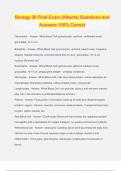Biology 20 Final Exam (Alberta) Questions and Answers 100% Correct Neutrophils - Answer - White blood Cell (granulocyte), sphirical, multilobed nuceli, granulated, 10 -14 um Basophils - Answer - White Blood Cell (granulocyte), sphirical, lobed nuclei, irregularly shaped, release histamine, promotes blood flow to injury, granulated, 10 -12 um, nucleus fills whole cell Eosinophils - Answer - White Blood Cell (granulocyte), sphirical, bilobed nuceli, granulated, 10 -14 um, phagocytize antigen - antibody complexes Monocytes - Answer - White Blood Cell, Can leave blood stream, further specialize as macrophages that destroy bacteria, kidney shaped nuclei, nongranular Lymphocytes - Answer - White Blood Cell, non granular, thymus and red bone marrow, play role in the formation of antibodies(defense function) Plasma - Answer - Fluid portion of the blood, made up of water plus dissolved gases, proteins, sugars, vitamins, minerals, hormones, waste products. Transports blood cells, oxygen, carbon dioxide, etc. Red Blood Cell - Answer - (Erythrocyte) Blood cell that contains the respiratory protein hemoglobin and is specialized for oxygen transport, no nucleus (formed part of blood) White Blood Cell - Answer - (leukocyte) Colorless blood cell that protects the body from infection by way of the immune response, plays a role in allergic reactions and inflammation. Three types: granulocytes, monocytes, lymphocytes (formed part of blood) Platelet - Answer - Component of the formed portion of the blood, consisting of fragments of cells that are created when larger cells in the bone marrow break apart, contains no nucleus and plays a key role in blood clotting Vasodilation - Answer - Expansion in the diameter of blood vessels; near the skin brings more blood to the surface to reduce body temperature Vasoconstriction - Answer - Decrease in the diameter of blood vessels; near the skin conserves body heat Atrioventricular (AV) node - Answer - Bundle of specialized muscle tissue located int he wall of the right atrium; receives electrical stimulus from the SA nose and transmits this impulse over the walls of the ventricles to start their contraction Bundle of His - Answer - Bundle of specialized fibers through which an electrical signal is transmitted from the AV node, initiating the contraction of the right and left ventricles Aorta - Answer - Major artery that carries oxygenated blood away from the heart to all regions of the body, except lungs Tricuspid Valve - Answer - (atrioventricular) Separates the right atria and ventricle, 3 flaps Bicuspid Valve - Answer - (atrioventricular) Separates the left atria and ventricle, 2 flaps Semilunar Valves - Answer - (Aortic + Pulmonary) Look like half moons, keep the blood when it is pumped to the lungs and body from leaking back into the heart Circulatory System - Answer - System of vessels that transports blood, the cells and substances suspended and dissolved in blood throughout the body. Links all systems; transports oxygen, waste, nutrients, hormones, medicine, enzymes, etc. Regulates internal temperature, protects against blood loss from injury, disease causing microbes, or toxic substances introduced to the body. Cardiovascular System - Answer - The heart and blood vessels, cardio= heart, vascular= vessels Pulmonary Pathway - Answer - Heart to lungs and back to the heart Systemic Pathway - Answer - Heart to body and back to the heart Coronary Pathway - Answer - Heart to heart vessels and back to the heart Heart's Functions - Answer - Pump blood through the body, keep oxygen rich blood separated from oxygen poor blood, ensure that blood flows only in one direction through the body Capillaries - Answer - The smallest blood vessel; gases and other substances are exchanged between the circulatory system and body tissues across one cell capillary wall Sinoatrial Node - Answer - Bundle of specialized muscle tissue located in the wall of the right atrium of the mammalian heart; generates an electrical impulse that stimulates cardiac muscle fibers to contract and relax rhythmically, producing a regular hear t beat (organic pacemaker) Cardiac Output - Answer - Cardiac output = heart rate x stroke volume (mL/min); average output = total volume of blood that circulates through the heart once per minute Atherosclerosis - Answer - Build up of plaque (fatty deposits, calcium, and fibrous tissues) on the inside of artery walls. Blood flow is decreased and blood pressure increased; Angioplasty and coronary bypass Blood - Answer - Tissue with a solid and fluid portion




